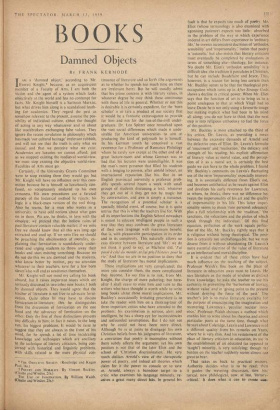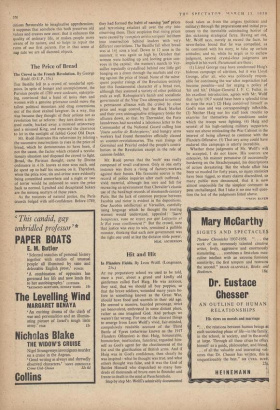BOOKS
Damned Objects
By FRANK KERMODE
T AM a 'damned object,' according to Mr. 'Everett Knight,* because, as an acquiescent member of a Faculty of Arts, 1 am both the victim and the agent of a system which looks objectively at the world and has no contempt for facts. Mr. Knight himself is a Sartrean Marxist, but what drives him along is a scandalised loath- ing for academics. They regard the past as somehow relevant to the present, assume the pos- sibility of individual culture, abhor the thought of acting in any way whatsoever and sit about like stockbrokers exchanging false values. They ignore the recent revolution in philosophy which has made 'our cultural heritage' irrelevant rubbish, and will not see that the truth is only what we intend, and that we perceive what we exist. Academics are luxuries we cannot afford; just as we stopped existing the medimval world-view, we must stop existing the objective world-view. Faculties of Arts must go.
Certainly, if the University Grants Committee were to stop existing them they would go; but Mr. Knight will have no influence over this com- mittee because he is himself so luxuriously con- fused, so voluptuously enslaved -to his own crossness. His own procedures are a farcical parody of the historical method he rejects; his logic is a black-mass version of the real thing. Also he seems, for a man who works in a university, to have odd notions about what goes On in them. We are, he thinks, in love with the obsolete; we pretend that the hollow ruins of past literature contain valuable matter; if we were free we should know that all this was long ago extracted and used up. If we were free we should be preaching the obsolescence of morality, ex- plaining that fornication is scandalously under- rated and urging students to throw away their books and start existing something. Because we do not do this we are damned and the students, who know better by instinct,, pay no 'attention whatever to their teachers, save for a few born slaves-who will end as academics themselves.
Mr. Knight will not mind my calling his book absurd; but it raises important issues which are seriously discussed in two other new books,t both by damned objects. They would agree that the teacher of literature is not free to advocate forni- cation. Quite often he may have to discuss fornication-in-literature; this he distinguishes from the discussion of fornication on the one hand and the advocacy of fornication on the other. Only the first of these distinctions presents any difficulty to him; in fact it raises, inghe long run, his biggest problems. It would be false to suggest that they are always in the front of his mind, for he spends a lot of time inculcating knowledge and techniques which are ancillary to the technique of literary criticism, being con- cerned with historical and linguistic problems, With skills related to the mere physical con- -- — -
*THE Otur.ctivi: (Routledge and Kcgan
Paul. 16s.)
t POE' RI' AND MORALIT1 By Vincent Buckley. (Chatto and Windt's. 21s.) • TtiF, Usr I M AGINABON. By William Walsh. (Chatto and Windus, 25s.) tinuance of literature and so forth (the arguments as to whether he spends too much time on these are irrelevant here). But he will usually admit that his prime concern is with literary values, in whatever degree he may think these continuous with those of life in general. Whether or not this is desirable it is certainly expedient, for the 'born scholar' is so rare a product of our society that it would be a fantastic extravagance to provide for him and not for the run-of-the-mill under- graduate. Dr. Leo Spitzer once remarked upon the vast social differences which made it unde- sirable for American universities to aim at producing the kind of polymath he is himself. In his German youth he conceived a vast reverence for a Professor of Romance Philology whom he rarely saw except at the other end of a great lecture-room and whose GeArman was so bad that his lectures were unintelligible. It was the man's mere presence that filled his students with a longing to possess, after untold labour, an international reputation like his. But in an English provincial university a professor prob- ably spends several hours a week with small groups of students discussing a text; whatever they get out of it they 'get not by magic but by Conversation, and awe is simply a nuisance. The recognition of a potential scholar is a specially blissful event, of course; but it is quite untrue that this is what the teachers live for. With all its imperfections the English School nowadays is meant to educate intelligent people in such a Way that they may confront the great literature of their own language with Maximum benefit; that is, with pleasurable participation in its order and in its complexity. This naturally allows no easy divorce between literature and 'life'; we do not think it good to say, as Michelet did, %Pal passe a cote du monde, et raj pris l'histoire pour la vie.' And thus we are in no position to deny that the study of literature has moral implications.
These implications are very complicated:, the more you consider them, the more complicated they become. To say this is to risk. from Mr. Knight, the charge of mere paltering; but here- after I shall cease to exist him and turn to the writers who have thought it worth while to write long books abut these moral implications. Mr. Eluckley's occasionally irritating procedure is to take the reader with him on a thinking-tour of three important critics who have attended to the problem; his examination is serious, alert and intelligent, he has a sharp eye for inconsistencies and unfounded assumptions. But I do not see why he could not have been more direct. Although he is at pains to disengage his own Christian beliefs from his judgments of literature, a conviction that poetry is incomplete without them subtly affects the argument; yet his own position is not that of the later Eliot and the school of 'Christian discrimination.' He very much dislikes Arnold's view of the therapeutic power of poetry, and indeed all theories which claim for it the power to console or to save us. Arnold, always a barndoor target to a critic who examines his language minutely, re- ceives a great many direct hits. In general his fault is that he expects too much of poetry. Mr. Eliot (whose terminology is also examined with agonising patience) expects too little: absorbed in the problem of the way in which experience ordered in art differs from experience in 'ordinary life,' he invents inconsistent doctrines of 'orthodox sensibility' and 'impersonality,' insists that poetry is `autotelic.' but also insists that literary criticism must eventually be completed by evaluations in terms of something else—theology, for instance. No doubt Mr. Eliot's 'orthodox sensibility' is a difficult idea; the tradition it postulates isChristian, but he can include Baudelaire and Joyce. This, however, is a reason for being less certain than Mr. Buckley seems to be that the theological pre- occupation which turns up in After Strange Gods shows a decline in critical power. When Mr. Eliot says that the function of art is to bring us to a point analagous to that at which Virgil had to leave Dante he is not only using a favourite image but making explicit what had been in his mind all along; you do not have to think that the next step is into religious orthodoxy to feel the force of this position.
Mr. Buckley is most attached to the third of his critics, Dr. Leavis, as providing a mean between the excessive demands of Arnold and the defective ones of Eliot. Dr. Leavis's formulte of 'enactment' and 'realisation,' the delicacy and strength of his reading, his explicit affirmation of literary value as moral value, and the percep- tion of it as a moral act, is certainly the best guide we can have to the whole problem. 1 found Mr. Buckley's comments on Leavis's fluctuating use of the term 'impersonality' especially interest- ing. It is essentially different from Eliot's use, and becomes antithetical as he reacts against Eliot and develops his early reverence for Lawrence, in whom, he thinks. there was no difference be- tween the impersonality of his art and the quality of impersonality in his life. This latter imper- sonality seems to mean 'rare personal adequacy' plus a full relationship with the 'tradition.' the sanctions, the valuations and the pieties of which speak through the individual.' Of this final equation, perfection of the work equals perfec- tion of the life, Mr. Buckley rightly says that it is religious without being theological. The posi- tion is certainly not unchallengeable, but we may dissent from it without abandoning Dr. Leavis's more essential doctrine of the value of literature as an intellectual and moral discipline.
It is evident that all these critics have had much influence on the teaching of the subject. Professor Walsh's fine book on the place of literature in education owes most to Leavis. He sees literature as the mode of wisdom as distinct from knowledge: he asks the teacher to use his -authority in preventing the 'barbarism of literacy without value' and in 'giving point to the present without denying the force of the past.' The teacher's job .is to rniae literature available for the purpose of emancipating the imagination and recovering Lawrence's 'peculiar nuclear inno- ence.' Professor Walsh chooses a method which enables him to write about his theories and about particular poets at the same time, though what he says about Coleridge. Leavis and Lawrence is of a different quality from his remarks on Yeats, where he is very thin. And his restatement of the place of literary criticism in education, its use in the establishment of an educated (as opposed to 'taught') minority, is very satisfying; though the burden on the teacher suddenly seems almost too great to bear.
That takes us back to practical matters. Authority decides what is to be read; then it guides the wavering discussion, now his- torical. now philological, now, at last, literar■,- critical.' It does what it can to create Goa.
ditions favourable to imaginative apprehension; it supposes that somehow this both preserves old values and creates new ones; that it enhances the quality of ordinary life, or makes people more aware of its nature, and so helps to repair the ruins of our first parents. For in that sense at any rate we are all damned objects.



















































 Previous page
Previous page